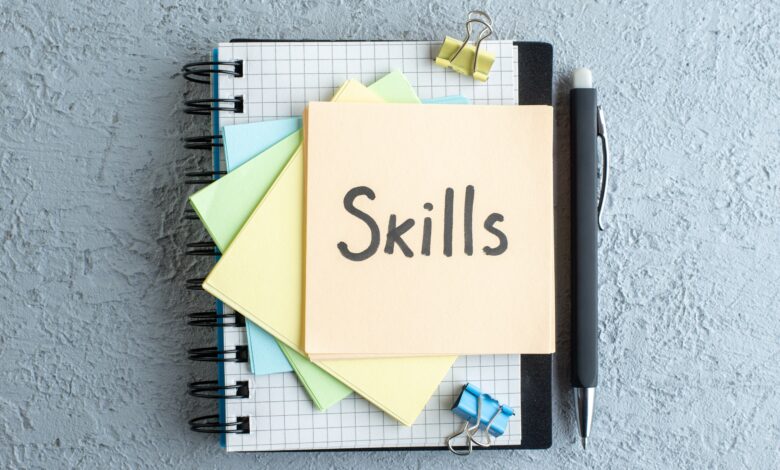Essential Skills to Have a Successful Career

A successful career is the result of not just hard work but also a certain skillset without which it is almost impossible. These skills are called foundational skills or employability skills. This includes important skills like communication which is essential in almost every job and Teamwork, which refers to the ability to work harmoniously with your colleagues to achieve a common goal. Reliability is also an important skill as it promotes trust between you and your employer or partner, and also Problem solving, which involves identifying key issues and a clear understanding of problems and determining the most effective solutions. Another very important skill is self management which refers to the ability to perform job duties satisfactorily with little to no supervision.
- Visual communication and Non-Verbal Communication Skills
Even when you’re not talking, you communicate through your body and gestures. As some people say, our words might lie but our body rarely does. it’s one among the foremost required soft skills for professionals. Your visual communication determines the way people perceive you. The way you lean in during a conversation or crossing your legs sends specific signals to the opposite parties you converse with. Rolling eyes could be a common metaphor for boredom or disagreement. Crossing your arms during a discussion shows a scarcity of agreement, too. Body language may be a complicated matter with different nuances across the world . While most best practices are universal, don’t neglect local differences when communicating internationally.
- Speech and Verbal Communication Skills
Glossophobia or the fear of speaking publicly is one among the foremost commonly known fears. Many professionals, including entrepreneurs and CEOs, fear speechmaking . People lose opportunities due to the fear of speechmaking, and lack of verbal communication skills. Overcoming the fear of speechmaking takes practice and a few executives may always get the chills before getting into front of a crowd. And yet, speechmaking and presenting are often required to perform your job as you climb up the ladder. Public speaking skills, as a branch of sentimental skills, aren’t limited to presenting an interview during a conference. Internal meetings, product demos, webinars also fall under this same category. - Social Skills
Many experts believe that growth in one’s career depends tons on good relationships. Your social skills determine the way you get in conjunction with your colleagues, friends, clients, and acquaintances in formal and informal situations.
Think about the chit-chat during conference breaks. Or the device talk at the office. How about other social gatherings like cocktails with people you don’t know? Evolving social skills as a medium to interact in chitchat , meet new people, and react to unexpected reactions during conversations could also be a strong tool in building powerful soft skills for fulfillment. - Negotiation Skills
Negotiation isn’t always about winning. It’s the power to reach an agreement where both parties benefit. it’s your ability to sway people into your way of thinking. And it’s not almost selling.
Negotiating may be a required trait for anyone hired for his or her critical business skills. no matter whether you’re selling, pitching a product to investors, or closing for a management role, learning the way to negotiate is of utmost importance for maintaining your leadership role.
Conveying your ideas during meetings and outlining the key selling benefits are sorts of squeeze play. Abusing this power can harm relationships. Underusing it results in a scarcity of opportunities. Understanding the way to navigate negotiation skills requires training upfront. - Conflict Resolution Skills
It might be internal conflicts within the organization, or with a client, or competitor.
The way you handle a conflicting situation impacts your personal also as organizational success. Listening carefully, placing your opinion smartly, and thinking logically will assist you resolve many conflicts effectively. Resolving conflicts at work is one among the key managerial skills that each organization looks for.
Giving and receiving feedback often escalates when either party fails to handle the context within the best manner. Excelling at handling conflict may be a crucial skill that each one managers should improve over time.
Any conflict that’s unresolved builds up which may cause workplace incidents or a sudden wave of resignations. - Stress Management Skills
Stress is one among the most important hurdles to success, because it brings down your productivity, and kills your motivation. an excessive amount of stress could affect your health adversely. Exceeding levels of stress cause burnout. Unlike a daily sickness, burnouts are hard to trace down and last a really long period of your time.
It’s not unlikely for an employee to perform poorly for weeks – or maybe months – thanks to external factors like stress or troubles reception . apart from the notable business impact, recovery may take months also – and this is often a business consequence you don’t want to affect post-factum.
There are several stress management techniques you’ll use to beat stress as swiftly and surely as possible. so as to avoid getting too stressed over trivial matters, it’s best to explore which technique can work for you best.




